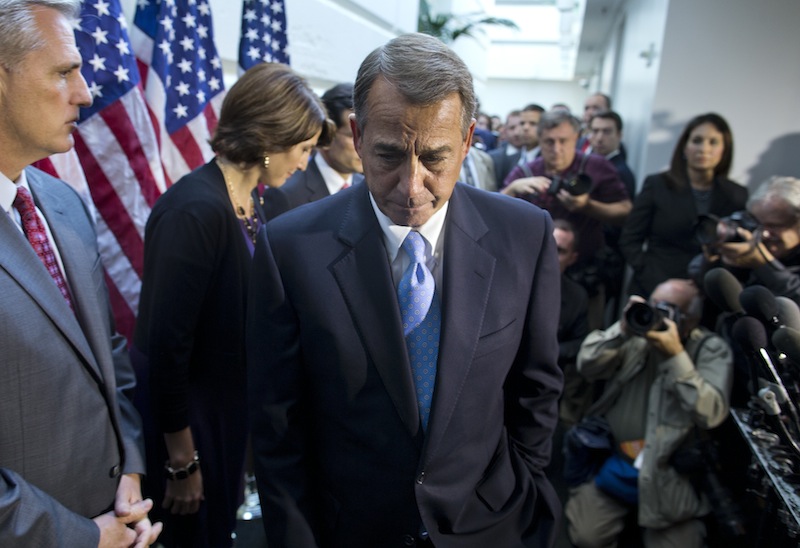“We’re not going to pass a clean debt limit increase,” House Speaker John Boehner warned the country on Oct. 6. “I told the president, there’s no way we’re going to pass one. The votes are not in the House to pass a clean debt limit. And the president is risking default by not having a conversation with us.”
Ten days later, the Ohio Republican brought up a clean debt limit increase, attached to a clean government funding resolution, and the bill passed the House with flying colors, 285-144. A majority of Senate Republicans voted for it. The GOP won no policy concessions. It was a complete, unvarnished surrender after they demanded an unraveling of Obamacare and a swath of other conservative goodies to avert default.
It was the second time in nine months that Republicans used the threat of a catastrophic debt default to force conservative fiscal reforms. And it was the second time in nine months that they backed down and freed the hostage after President Barack Obama and Democratic leaders stonewalled and refused to pay ransom.
“We stood up to Republicans and proved that we won’t give in to their hostage-taking politics,” said a senior Democratic Senate aide. “Republicans should now understand that we won’t be threatened or bullied into giving them what they want.”
Congress’ after-dusk votes Wednesday to raise the debt ceiling and re-open the shuttered government were a watershed moment in the era of governance by hostage-taking. Republicans proved they were willing to spur a shutdown, which has been costly but not disastrous. But the debt ceiling is a different beast. Republicans folded one day before the deadline, proving that default is a bridge too far for them. That suggests it has all but lost its utility as a weapon for a party out of power to demand concessions from the president.
The next debt limit hike will be required once Treasury exhausts the extraordinary measures available to borrow after the Feb. 7 deadline. And even the staunchest conservatives in the House see the writing on the wall after the GOP freed the hostage this time.
“There’s nothing in this for conservatives. Not even a bright or shiny object,” a despondent Rep. Tom Massie (R-KY) told TPM. “I don’t know how you negotiate up from this capitulation. I think the long faces are a result of the realization, if not the vocalization yet, that this sets the precedent for this Congress.”
Conservatives have fond memories of the 2011 debt limit standoff where an emboldened Republican House majority leveraged the threat of default to force a dejected Obama into accepting more than $2 trillion in spending reductions, half of it through through the automatic cuts known as sequestration. But those days are long gone. Obama believes he made a huge mistake by letting the opposition party use the threat of disaster to set policy, and has since taken a hard line against debt limit negotiations in order to break that precedent.
“To my friends in Congress: Understand that how business is done in this town has to change,” Obama said Thursday morning, chiding Republicans for repeated brinkmanship and the practice of “lurching from manufactured crisis to manufactured crisis.”
He has called the GOP’s bluff twice since then and watched them fold both times. In January 2013, before the country’s borrowing authority was set to expire, House Republicans initially demanded cuts and reforms again in order to lift the ceiling. Obama made abundantly clear he wasn’t about to give up anything merely to avert crisis. And Republicans caved, agreeing to extend the debt limit without policy add-ons. This time around, at the end of the day, even conservatives threw up their hands and praised Boehner for fighting the good fight.
“We fought hard to get as many reforms as we possibly could,” Rep. Kristi Noem (R-SD) told TPM. “It’s been a valiant effort.”
A provision in the Wednesday legislation allows Congress to vote on a “motion to disapprove” of a debt limit hike, without a real threat of default. That suggests the debt limit appears to be returning to its traditional place: an opportunity for the party out of power to grandstand and score political points against the president — much as Sen. Barack Obama did in 2006, when he voted against a debt ceiling hike and used the occasion to excoriate George W. Bush (a move he later said he regretted). Default wasn’t seriously threatened then, and after this fiasco, GOP leaders cannot credibly do so again, lest Obama call their bluff a third time.
“I think some of our members may have thought the default issue was a hostage you might take a chance at shooting. Most of us didn’t think that,” said Senate Minority Leader Mitch McConnell (R-KY) after the 2011 standoff. “What we did learn is this — it’s a hostage that’s worth ransoming. And it focuses the Congress on something that must be done.”






